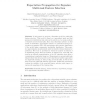1047 search results - page 115 / 210 » Learning the required number of agents for complex tasks |
PKDD
2010
Springer
13 years 6 months ago
2010
Springer
In this paper we propose a Bayesian model for multi-task feature selection. This model is based on a generalized spike and slab sparse prior distribution that enforces the selectio...
ECML
1997
Springer
14 years 1 days ago
1997
Springer
In learning from examples it is often useful to expand an attribute-vector representation by intermediate concepts. The usual advantage of such structuring of the learning problemi...
CHI
2007
ACM
13 years 12 months ago
2007
ACM
Software developers must modify their programs to keep up with changing requirements and designs. Often, a conceptually simple change can require numerous edits that are similar b...
JMLR
2010
13 years 2 months ago
2010
Structured prediction tasks pose a fundamental trade-off between the need for model complexity to increase predictive power and the limited computational resources for inference i...
ATAL
2003
Springer
14 years 1 months ago
2003
Springer
In a large distributed system it is often infeasible or even impossible to perform diagnosis using a single model of the whole system. Instead, several spatially distributed local...

